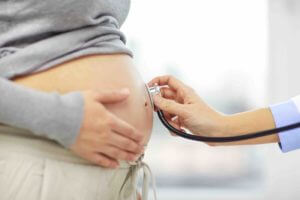During pregnancy, the risk of developing cystitis is also increased. This has to do with hormonal changes in the woman’s body. These make it easier for bacteria to penetrate the urinary tract and trigger an inflammation there.
Although most urinary tract infections are harmless, cystitis during pregnancy can lead to serious complications. It is therefore important to see a doctor immediately at the first signs, such as burning during urination.
This is because if the infection rises to the kidneys, it can cause renal pelvic inflammation there.
Table of contents
What Causes Cystitis?
Doctors do not usually speak of cystitis, but of a urinary tract infection. Often, it is not only the bladder that becomes inflamed, but also the urethra itself.
A urinary tract infection is triggered by bacteria that enter the urinary tract, i.e. the urethra and urinary bladder. The most common trigger is pathogens from the intestines, the so-called Escherichia coli bacteria.
They can enter the urethra from the anus, for example, through improper cleaning after going to the toilet. Normally, invaded pathogens are flushed out again during urination.
Therefore, it is also important to drink a lot and regularly. However, if the protective mechanisms of the bladder are disturbed, the pathogens may ascend via the ureter to the bladder, multiply there and cause inflammation of the mucous membranes.
An untreated urinary tract infection can even ascend to the kidneys, where it can lead to inflammation of the renal pelvis. This is much more serious than cystitis.
In addition to intestinal bacteria, other germs can also irritate the bladder. Women are generally much more susceptible to bladder infections than men due to their shorter urethra.
Are Bladder Infections More Common During Pregnancy?
Whether you are prone to bladder infections or not, the risk of a urinary tract infection is significantly increased during pregnancy. Among other things, the pregnancy hormone progesterone is to blame.
It loosens up the entire musculature in the abdomen and does not even stop at the bladder. The urinary tract is therefore dilated during pregnancy and germs and bacteria can penetrate more easily.
The progesterone level also remains elevated in the first weeks after birth, in the so-called puerperium. This means that urinary tract infections can still occur more frequently during this time. However, it is not only the hormonal changes that promote bladder infections during pregnancy.
The growing uterus poses an additional problem. It puts pressure on the bladder, pushing it further down, giving bacteria an even easier time to rise and cause inflammation. This also explains why bladder infections occur mostly in the 3rd trimester.
You Can Recognize A Bladder Infection In Pregnancy By These Symptoms
Pain, burning, cramps and a constant urge to go to the toilet – most people are familiar with cystitis and its symptoms. Although a urinary tract infection is usually uncomplicated, it can cause major problems during pregnancy.
Therefore, look out for the following symptoms in you during pregnancy:
- Frequent urination
- Burning or pain when urinating
- Unpleasant smelling urine
- Pain in the lower abdomen
- (Visible) blood in the urine
If you experience any of these symptoms, you should see a doctor as soon as possible and have your urine checked. An untreated bladder infection during pregnancy not only threatens your health but also that of your child.
The earlier the infection is detected, the better and faster it can be treated without any complications.
Renal Pelvic Inflammation – These Are The Symptoms
If the bacteria ascend to the kidneys, they can cause renal pelvic inflammation there. This is a bacterial infection of the kidney and renal pelvis. In acute renal pelvic inflammation, the symptoms are very similar to those of a urinary tract infection. However, the following symptoms may be added:
- Fever, chills
- Flank pain
- General malaise
Acute renal pelvic inflammation is not to be trifled with. As a rule, it is associated with severe pain and can lead to a life-threatening clinical picture if left untreated. Especially during pregnancy, immediate action is required in the event of a kidney pelvic inflammation in order to prevent dangerous complications.
Is Cystitis Dangerous During Pregnancy?
A bladder infection during pregnancy is not only extremely unpleasant, but in the worst case it can even threaten the health of mother and child. This is especially true if the infection is untreated and has developed into a kidney pelvic inflammation.
The mother is then threatened not only with permanent kidney damage, but also with an increased risk of pre-eclampsia, formerly also known as pregnancy poisoning. For many expectant mothers, however, the more pressing question is: What damage can my unborn child suffer?
The good news is that if cystitis is treated quickly during pregnancy, the baby is usually not at risk. However, cystitis can also occur asymptomatically.
This means that the pathogens are detectable in the urine, i.e. there is de facto an inflammation, but there are hardly any symptoms or none at all in the mother. This can be dangerous under certain circumstances, as untreated cystitis during pregnancy can lead to inflammation of the renal pelvis and then cause premature birth or miscarriage, as well as premature labor.
However, there is no need to worry. If you have regular checkups with your gynecologist, he or she will notice it right away if there is something wrong with your urinary bladder. Urine tests are part of every routine examination.
How Is Cystitis Treated During Pregnancy?
Normally, bladder infections disappear on their own within a few days. However, pregnant women are in a high-risk group because of the possible complications.
Therefore, if cystitis occurs during pregnancy, it is essential to treat it with an appropriate antibiotic. Penicillin, erythromycin or cephalosporins are often used.
Many expectant mothers worry that the antibiotics may harm their child. However, this concern is unfounded. Your doctor will only prescribe antibiotics that are well tolerated during pregnancy.
Besides, the impending consequences of a severe bladder infection for the baby are considered more serious than the possible side effects of a drug. If cystitis develops into renal pelvic inflammation during pregnancy, the affected person is usually admitted to the hospital immediately as an inpatient.
Even outside of pregnancy, acute renal pelvic inflammation is in fact a dangerous condition that requires immediate medical attention.
These Home Remedies Help With Cystitis
Home remedies can help with cystitis. Antibiotics destroy the pathogens quickly and efficiently, but it is still useful to support the healing process with additional measures.
It is important to drink properly and go to the toilet regularly in case of cystitis during pregnancy, even if it can be very uncomfortable. In the pharmacy, you can get special bladder and kidney teas, which contain proven herbal active ingredients.
They have a diuretic, anti-inflammatory, and antibacterial effect. Medicinal herbs include nettle, bearberry leaves, and juniper. Warm sitz baths are also considered effective in bladder or kidney pelvic inflammation and can relieve the symptoms. Chamomile is particularly suitable for a sitz bath, due to its antibacterial effect.
Note: Home remedies alone are definitely not sufficient for cystitis during pregnancy. If you notice the first signs of an infection, you should absolutely refrain from self-experimentation and unauthorized use of medications, but instead, quickly visit your gynecologist.
Many medicines that you can otherwise take without any problems are not entirely safe during pregnancy. Your doctor will prescribe suitable antibiotics that your baby will also tolerate well, in order to quickly get cystitis under control.
How To Prevent Cystitis During Pregnancy
Although cystitis during pregnancy is usually easily treatable, it is much better to prevent it from happening in the first place. You can do a few things yourself to protect your bladder and kidney from infection. Follow these simple behavioral tips.
Drink, drink: A very simple but highly effective way to prevent cystitis is to drink water, and drink it in sufficient quantities. Try to drink about two liters of water every day. This will help your body to quickly flush invading pathogens out of the bladder. If you don’t like drinking water, you can also drink herbal teas or cranberry juice.
Go to the toilet regularly: If you delay urination unnecessarily, urine will back up and pathogens can multiply more quickly. You should therefore go to the toilet as soon as you feel the urge to urinate. Every time you urinate, germs and bacteria are flushed out.
Clean yourself properly: It is important to clean yourself properly after going to the toilet to avoid carrying intestinal bacteria into the urethra. Therefore, make sure to always wipe from front to back.
Good intimate hygiene: If the vaginal flora is out of balance, bacteria have an easier time getting into the urinary tract and causing inflammation. You should therefore clean your intimate area regularly with lukewarm water or a special intimate washing lotion. Also, it may be helpful to wash your underwear hot to kill any germs.
Keep warm: While cold alone cannot cause inflammation, it can promote it because it weakens the immune system. Therefore, during pregnancy, make sure to always keep your abdomen and feet nice and warm to prevent hypothermia.
If you make an effort to follow the above tips every day, you can significantly reduce the risk of bladder infection during pregnancy. And if an infection does occur, don’t worry. Your gynecologist knows what to do in this case and will do everything to make the infection disappear quickly and not harm your baby.












